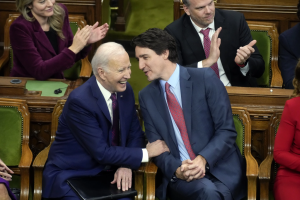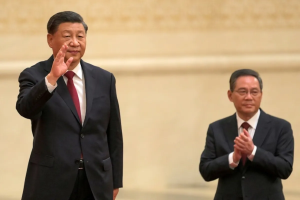Look out for “subsidies for fossil fuels with green strings attached to them” in spring budget, says Prof. Kathryn Harrison
Prof. Kathryn Harrison was quoted in a National Observer article about potential clean energy investments in the 2023 Canadian spring budget, noting that despite climate change science, “the U.S. and Canadian governments continue to approve new fossil fuel infrastructure.”
Prof. Kathryn Harrison comments on the consequences of BC’s record fossil fuel export revenues
“I think at minimum we need to be making economic plans, with a longer-term view,” said Prof. Harrison about BC’s provincial energy and climate plans, “that are anticipating what could happen to the international markets for our fossil fuel exports.”
Visiting Prof. Swaran Singh writes on China’s slow and steady leadership transition after China’s quinquennial Two Sessions
“Both Xi’s unprecedented third term in office and China already being an advanced economy now place real tough challenges on the shoulders of Xi’s new team who are expected to sustain the magic that Deng Xiaoping’s reforms unleashed from the early 1990s.”
In light of King Charles’ coronation, Prof. Emeritus Philip Resnick asks: should Canada retain a British monarch as our official head of state?
“Were Canada to go the republican route, we would need to do so through a long constitutional process. The Canadian constitution states that there must be unanimity of the provinces for changing the head of state. In addition, treaties between First Nations and the Crown would have to be carried forward into a Canadian republic.”
Prof. Max Cameron says conflict of interest complaint against Coun. Rob Stutt “may have merit”
“At minimum, Stutt should have disclosed that his son and daughter worked for the RCMP and also possibly recused himself,” said Prof. Cameron. “While it may not amount to a conflict of interest, it could create the appearance of a conflict of interest, which is also important.”
Prof. Yves Tiberghien, Prof. Heidi Tworek and MA Candidate Panthea Pourmalek call global data governance “fragmented and inadequate”
“Many economic frameworks and partnerships try to address small slices of the issue. But only very few people and companies, or even governments, can keep up with that many agreements and efforts… Ultimately, it is citizens who lose out — in their privacy, their human rights and their share of any potential benefits.”
The Ubyssey recaps “How Ancestral Voyaging Mobilizes Knowledge of Biodiversity and Climate Change”
The event, “How Ancestral Voyaging Mobilizes Knowledge of Biodiversity and Climate Change”, has been “four years in the making, writes the Ubyssey. “Sustainability remains a centerpiece in voyaging practices. Performing rituals, using local and organic materials to build canoes and sailing within parameters to protect marine life are practices rooted in the principle of reciprocity with the natural environment.”
Op-Ed: Prof. Kathryn Harrison writes that LNG Canada is “bullying provincial and federal governments”
“LNG Canada’s project cleared federal and provincial environmental assessments in 2015. However, both levels of government still have options to ensure that this project only proceeds if it’s consistent with climate goals,” write Prof. Kathryn Harrison and colleague Karen Tam Wu.
Prof. Max Cameron discusses the tumultuous state of democracy in Peru
Prof. Cameron specifically mentioned Alberto Fujimori, who he says “had sold some property and bought a tractor, and drove around in this tractor with a trailer behind it, called it the Fujimobile, drove around the shantytowns of Peru, gathering popular support.”
Prof. Paul Quirk comments on Republican reelection of Chair Ronna McDaniel
“McDaniel has held the position by the grace of Donald Trump’s support,” says Prof. Quirk. “She has catered to his preferences on rules for delegate selection, the sharing of campaign funds, and other issues.”









